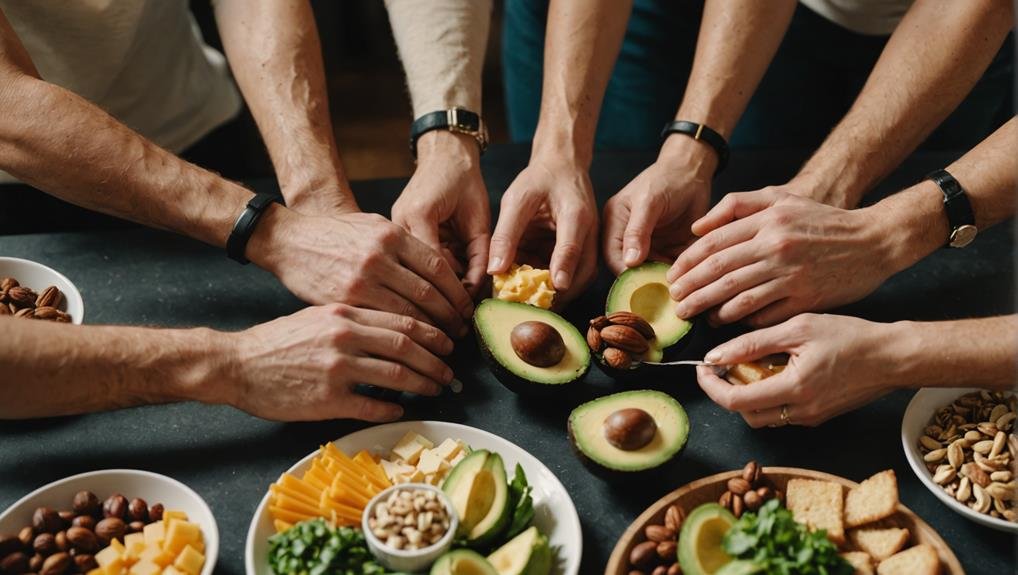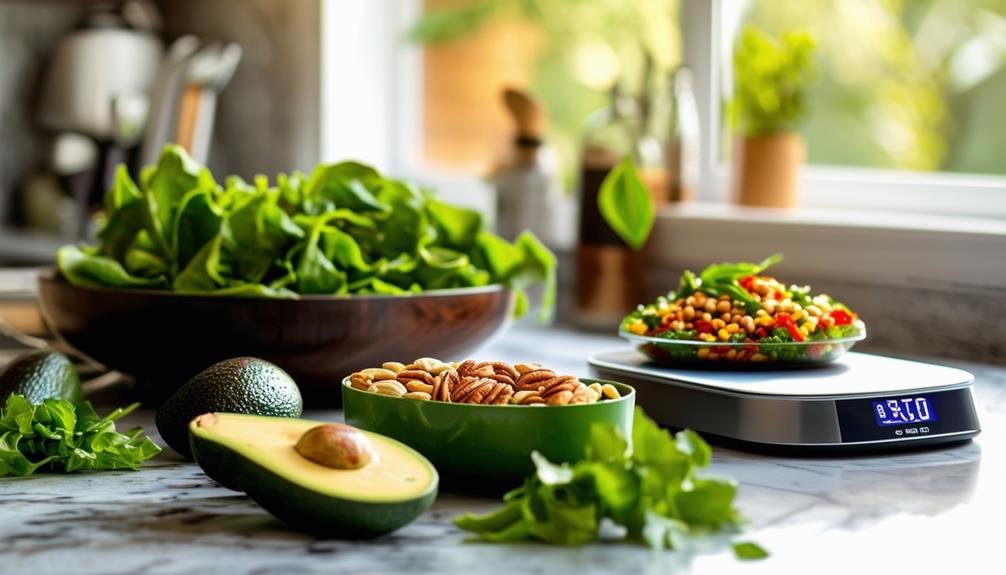Starting the keto diet can feel manageable with the right approach.
Focus first on meal planning and comprehending macronutrient ratios—aiming for 70-80% of your calories from fats and limiting your carbohydrate intake to 20-30 grams daily. Staying hydrated is crucial, and you may want to consider electrolyte supplements to alleviate the 'keto flu' that can occur during the transition.
Batch cooking is an effective way to prepare meals in advance and save time. Connecting with online keto communities can provide support and a wealth of recipe ideas.
Additionally, tracking your food intake is essential to ensure you are meeting your macro goals. By following these guidelines, you can stay organized and focused as you embark on your keto journey, paving the way to uncovering more strategies for success.
Key Takeaways
- Start by gradually reducing your carbohydrate intake to help your body transition into ketosis smoothly and reduce the likelihood of experiencing keto flu symptoms.
- Make meal planning and batch cooking a priority to stay organized and ensure you have convenient, ready-to-eat meals on hand.
- Concentrate on consuming whole, nutrient-dense foods to achieve your macronutrient targets while feeling satisfied and nourished.
- Utilize apps or tracking tools to monitor your macronutrient intake, allowing you to make necessary adjustments for optimal progress.
Understanding the Keto Diet
Understanding the ketogenic (keto) diet involves recognizing its primary focus on high fat and low carbohydrate intake, which facilitates the body's transition into a metabolic state known as ketosis. This state occurs when carbohydrate consumption is significantly reduced, generally limiting net carb intake to 20-30 grams per day. In ketosis, the body shifts from using glucose as its main energy source to burning stored fat, which produces ketones for energy. This metabolic adjustment can be advantageous for weight loss, as it encourages fat utilization.
On the keto diet, healthy fats should constitute approximately 70-80% of your total caloric intake. Recommended sources include avocados, nuts, seeds, and olive oil. Additionally, protein intake should comprise about 20-25% of your diet. It's crucial to prioritize whole, nutrient-dense foods and to avoid processed products, as they may contain hidden sugars or excessive carbohydrates.
In the initial week of adopting this low-carb diet, individuals often encounter what's commonly referred to as the 'keto flu.' Symptoms may include fatigue, headaches, and irritability, resulting from the body adjusting to lower carbohydrate levels. Staying well-hydrated and maintaining sufficient electrolyte intake can significantly alleviate these symptoms.
Preparing for the Keto Flu
Preparing for the keto flu is crucial for making your transition into ketosis smoother and for minimizing unpleasant symptoms. This temporary phase usually lasts between 1 to 3 days and may cause fatigue, headaches, irritability, and muscle cramps as your body adjusts to a low-carbohydrate diet.
Staying properly hydrated is essential during this transition. Aim to consume at least half your body weight in ounces of water each day to avoid dehydration and counteract the water loss that often occurs on the keto diet.
Electrolytes are important in alleviating symptoms associated with the keto flu. Supplementing with sodium, potassium, and magnesium can significantly ease discomfort during this adjustment period. Incorporating meals rich in these electrolytes, such as bone broth and leafy greens, can be beneficial. It's advisable to prepare meals that meet your body's needs during this stage.
To further alleviate the effects of the keto flu, consider gradually reducing your carbohydrate intake instead of making drastic cuts. This softer approach can lessen the intensity of symptoms as your body acclimates to the new dietary pattern, helping you to experience a more manageable transition.
Essential Tips for Beginners

To begin your keto journey successfully, it's crucial to master meal planning.
Ensure that you're consuming adequate healthy fats while keeping your carbohydrate intake low.
Additionally, prioritize daily hydration, as it supports your body's transition to ketosis and helps you feel your best.
Master Meal Planning
Mastering meal planning is essential for anyone starting their keto journey, as it helps you remain organized and committed to your dietary goals. To establish a successful routine, set aside a specific time each week dedicated to meal planning. This structured approach not only facilitates the creation of a comprehensive meal plan but also helps you steer clear of last-minute unhealthy food choices.
Begin by drafting a grocery list based on your planned meals. This ensures a streamlined shopping experience, guaranteeing that you have all the necessary ingredients for delicious keto-friendly dishes.
Consider batch cooking as an effective strategy to save time and reduce stress. Preparing multiple meals at once means you'll have ready-to-eat options available throughout the week, preventing feelings of overwhelm during your busiest days. Include a variety of keto snacks in your meal prep, such as cheese cubes, hard-boiled eggs, and nuts, to help satisfy cravings for unhealthy snacks.
Explore reputable online resources for easy keto recipes to keep your meal plan fresh and engaging. Maintaining variety in your meals is crucial for sustaining motivation and adherence to your diet.
Stay Hydrated Daily
Staying adequately hydrated each day is essential for effectively managing the challenges associated with the keto diet, particularly during the transition to ketosis. As your body adapts to this metabolic state, you may experience increased urination, which can elevate the risk of dehydration. To counteract this, it's vital to increase your water intake. A general guideline is to drink approximately half your body weight in ounces of water daily to ensure you maintain optimal hydration.
Here are some practical tips to help you stay hydrated:
- Incorporate electrolyte-rich beverages such as bone broth or specific supplements to help replace lost minerals.
- Keep an eye on your hydration status by observing the color of your urine—pale yellow indicates proper hydration, while dark yellow may mean you need to drink more fluids.
- Be mindful that caffeine can have a dehydrating effect; therefore, aim to balance any coffee or tea consumption with additional water.
Meal Planning Strategies
Effective meal planning is crucial for successfully adhering to a keto diet. By setting aside a specific time each week for meal preparation, you can establish a systematic approach that minimizes the risk of making impulsive, non-keto food choices.
Begin by utilizing various online resources, such as keto blogs and recipe websites, to gather a repertoire of meal ideas that align with your dietary objectives. Incorporate adaptable meal options into your plan, allowing for adjustments based on available ingredients or your schedule.
For particularly busy days, batch cooking is a highly effective strategy, ensuring that you have keto-friendly meals prepared and readily accessible. Additionally, tracking your food intake consistently is key, as it allows you to evaluate how well your meal plan supports your goals and make informed changes as needed.
To create a supportive atmosphere, communicate your dietary objectives with friends and family. Their understanding can facilitate your adherence to the meal plan and enhance accountability.
Regularly reviewing your meal planning strategies will ensure they remain effective, relevant, and supportive of your lifestyle changes.
Building a Support System

Building a robust support system can significantly enhance your keto journey. Connecting with others who share similar goals can provide motivation, recipe ideas, and effective progress tracking. Here are some strategies to foster connections on your keto path:
- Online Communities: Engage in keto-oriented groups on platforms like Facebook. These communities can offer valuable tips and shared experiences from fellow followers of the diet.
- Keto Influencers: Follow keto influencers on social media channels such as Instagram and TikTok. They share inspiration, dynamic recipes, and insights into maintaining a ketogenic lifestyle.
- Local or Virtual Meetups: Join local or virtual keto meetups to establish face-to-face connections that promote a sense of community and accountability.
Connecting with others can deepen your commitment to the keto lifestyle. The shared knowledge and encouragement from both communities and individual interactions can be invaluable when facing challenges.
Tracking Your Macros
Building a strong support system is vital for your success on the keto journey, but tracking your macros is a fundamental practice that enhances your ability to meet your dietary objectives. Macro tracking involves keeping a close eye on your intake of proteins, fats, and carbohydrates to ensure you're following the appropriate keto ratios—approximately 70-75% fats, 20-25% protein, and 5-10% carbohydrates. For those new to the keto diet, limiting net carbs to 20-30 grams can promote a smoother transition into ketosis.
To streamline the process, you can use a food diary or mobile apps designed for logging meals and tracking your progress. It's crucial to prioritize whole, nutrient-dense foods to avoid the common pitfalls associated with “dirty keto,” where you might fulfill carb limits while neglecting overall health. Regularly reviewing and adjusting your macro goals according to your progress, activity level, and health results can optimize your keto experience.
Here's a concise reference table to assist you:
| Macro Type | Recommended Ratio |
|---|---|
| Fats | 70-75% |
| Protein | 20-25% |
| Carbohydrates | 5-10% (Net Carbs: 20-30g for beginners) |
Frequently Asked Questions
How Do I Survive My First Week of Keto?
To successfully navigate your first week on a keto diet, prioritize meal preparation, stay hydrated, and create a comprehensive grocery list. Investigate various snack options, explore low-carb alternatives, and try out different keto recipes. It's essential to adopt a positive mindset and seek support from community resources. Additionally, consider adjusting your workout routines to align with your new dietary approach.
What Day Is the Hardest When Starting Keto?
The toughest days when beginning a ketogenic diet generally occur on the second or third day. During this time, many individuals experience carbohydrate withdrawal, intense cravings for carbs, and a noticeable dip in energy levels. To facilitate a smoother transition into ketosis, it's crucial to prioritize meal planning, discover suitable snack options, and explore a variety of recipe ideas.
How Long Do You Feel Bad When Starting Keto?
Starting the keto diet can feel challenging, akin to running a marathon. During the adaptation phase, often referred to as the "keto flu," you might experience discomfort for up to a week. To alleviate symptoms, focus on staying hydrated, maintaining electrolyte balance, and planning your meals effectively. These steps can help improve your energy levels and reduce cravings.
Is It Normal to Not Feel Full Starting Keto?
It's common to feel increased hunger when starting a ketogenic diet. As your body adjusts and becomes fat-adapted, your appetite regulation will stabilize. To better manage food cravings and improve feelings of fullness, pay attention to portion sizes, prioritize nutrient-dense foods, maintain proper hydration, and optimize meal timing.
Conclusion
Starting a keto journey might initially seem daunting, but you're already taking a positive step by looking for guidance.
While the preparation can feel overwhelming, it's crucial for easing your transition. By familiarizing yourself with the keto diet, addressing the keto flu, and organizing your meals, you can make the process much simpler.
Establishing a support network and monitoring your macronutrient intake will enhance your dedication.
With these approaches, you'll soon find that adopting a keto lifestyle can be a manageable and rewarding choice.
